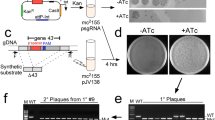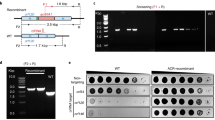Abstract
THOMAS et al.1 have constructed a derivative of phage λ (λgt·λC) that is useful for cloning DNA fragments 1,000 to 15,000 base pairs long from other organisms. Their cloning procedure involves cutting the phage DNA into three fragments with EcoRI nuclease, removing the central (or “C”) fragment, and annealing the outside fragments with an RI digest of foreign DNA. We have recently introduced three amber mutations—Wam403, Eam1100, and Sam100—into λgt·λC with the object of making the phage less likely to encounter a susceptible host in nature2. The NIH Advisory Committee on Recombinant DNA Research, on the basis of appropriate tests, has certified λgtWES·λC as an EK2 vector3,4.
This is a preview of subscription content, access via your institution
Access options
Subscribe to this journal
Receive 51 print issues and online access
$199.00 per year
only $3.90 per issue
Buy this article
- Purchase on Springer Link
- Instant access to full article PDF
Prices may be subject to local taxes which are calculated during checkout
Similar content being viewed by others
References
Thomas, M., Cameron, J. R., and Davis, R. W., Proc. natn. Acad. Sci. U.S.A., 71, 4579–4583 (1974).
Enquist, L., Tiemeier, D., Leder, P., Weisberg, R., and Sternberg, N., Nature, 259, 596–598 (1976).
Annex to Nucleic Acid Recombinant Scientific Memoranda, September 15, 1975–January 15, 1976.
Nucleic Acid Recombinant Scientific Memoranda, May 15–September 15, 1976 (in the press).
Parkinson, J. S., J. molec. Biol, 56, 385–401 (1971).
Davidson, N., and Szybalski, W., The Bacteriophage Lambda (edit. by Hershey, A. D.), 45–82 (Cold Spring Harbor Laboratory, New York, 1971).
Skalka, A., The Bacteriophage Lambda (edit. by Hershey, A. D.), 535–547 (Cold Spring Harbor Laboratory, New York, 1971).
Thomas, M., and Davis, R. W., J. molec. Biol, 91, 315–328 (1975).
Haggerty, D. M., and Schleif, R. F., J. Virol, 18, 659–663 (1976).
Schrenk, W. J., and Weisberg, R. A., Molec. gen. Genet., 137, 101–107 (1975).
Barbour, S. D., Nagaishi, H., Templin, A., and Clark, A. J., Proc. natn. Acad. Sci. U.S.A., 67, 128–135 (1970).
Cameron, J. R., Panasenko, S. M., Lehman, I. R., and Davis, R. W., Proc. natn. Acad. Sci. U.S.A., 72, 3416–3420 (1975).
Enquist, L., and Weisberg, R., Virology, 72, 147–153 (1976).
Shimada, K., Weisberg, R. A., and Gottesman, M. E., J. molec. Biol, 63, 483–503 (1972).
Sternberg, N. J., J. molec. Biol, 76, 1–23 (1973).
Zissler, J., Signer, E., and Schaefer, F., The Bacteriophage Lambda (edit. by Hershey, A. D.), 455–468 (Cold Spring Harbor Laboratory, New York, 1971).
Helling, R. B., Goodman, H. M., and Boyer, H. W., J. Virol, 14, 1235–1244 (1974).
Author information
Authors and Affiliations
Rights and permissions
About this article
Cite this article
TIEMEIER, D., ENQUIST, L. & LEDER, P. Improved derivative of a phage λ EK2 vector for cloning recombinant DNA. Nature 263, 526–527 (1976). https://doi.org/10.1038/263526a0
Received:
Accepted:
Issue Date:
DOI: https://doi.org/10.1038/263526a0
This article is cited by
-
Gene mapping from a bovine 1;29 DNA library prepared with chromosome microdissection
Mammalian Genome (1994)
-
Cloning and characterization of the ribosomal RNA genes of Rhynchosciara americana
Chromosoma (1982)
-
Site of linkage between adenovirus type 12 and cell DNAs in hamster tumour line CLAC3
Nature (1981)
-
Identification and nucleotide sequence of a diversity DNA segment (D) of immunoglobulin heavy-chain genes
Nature (1981)
Comments
By submitting a comment you agree to abide by our Terms and Community Guidelines. If you find something abusive or that does not comply with our terms or guidelines please flag it as inappropriate.



